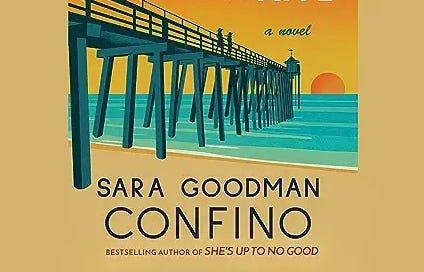BookLife Review: Don't Forget to Write, by Sara Goodman Confino
Historical fiction, 1960s, Avalon, Jersey Shore, Philadelphia, Jewish community, writer, eccentric aunt.
Don’t Forget to Write was a pleasant surprise. Set in the 1960s largely in Avalon, New Jersey (and a bit in Philadelphia), 20-year old protagonist Marilyn Kleinman, is home from college for the summer, and gets caught, quite dramatically, smooching the rabbi’s son during Shabbat services at her family’s temple. Her father is mortified and at a loss of what to do with what he perceives as his “promiscuous” rebel of a daughter. Marilyn is sent to live with her great Aunt Ada for the summer, first in Philadelphia and then to the Jersey shore to her aunt’s summer residence. Aunt Ada is strict but possessed of an independent, self-determined and wild streak not unlike her great niece. Ada is independently wealthy and operates a successful Jewish match-making service.
While the novel does fall victim to some romantic comedy tropes, the decoy wrong match beau, the misunderstood daughter, and the unearthing of some family secrets, and a budding writer protagonist, the novel nonetheless has some fresh takes. Aunt Ada is delicious. Strict and flashy, wild and disciplined, she is an active, feisty 70-something character, one not often seen so fully realized in contemporary fiction. A former WWI army nurse, Ada has a rebellious history and story of her own, as does Marlyn’s own mother who spent her own summer with Aunt Ada. Aunt Ada’s antics and secrets, as well as Marilyn’s, keep the story lively.
The Jersey Shore in the 1960s is a bit of a character here itself. While Avalon is quiet in those years, nearby Atlantic City and other hot spots are jumping with boardwalks, casinos, clubs and celebrities, all well-known to Ada. The story harkens to a simpler and at the same time more repressive era, where women dressed and made up for dates, gentlemen arrived at the door with flowers, and ladies wore headscarves when driving or riding in a convertible. The feminist movement, birth control pills and the sexual revolution were not yet in full bloom and expectations for women were low, with most expected to marry and tend the home. Ada and Marilyn were personalities born to buck that mold and eager to live independently and differently. That path was a difficult one to forge then, and the novel is both a harbinger and a reminder of change.




